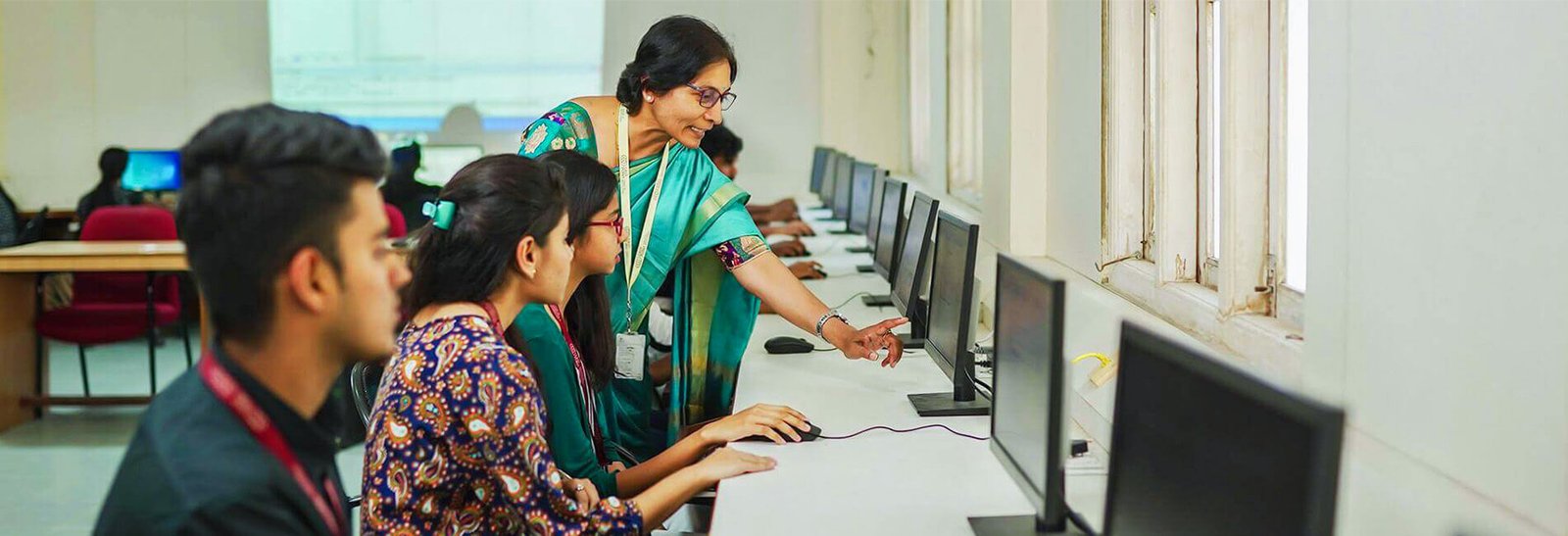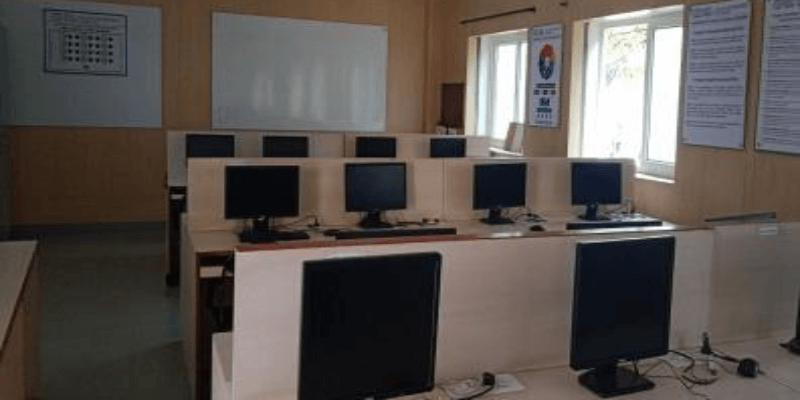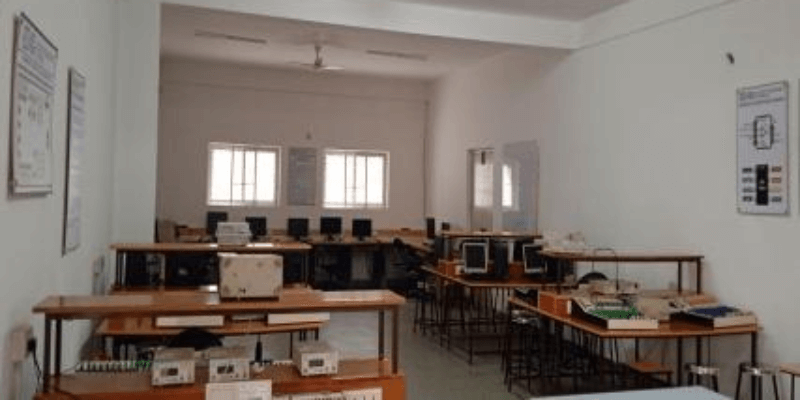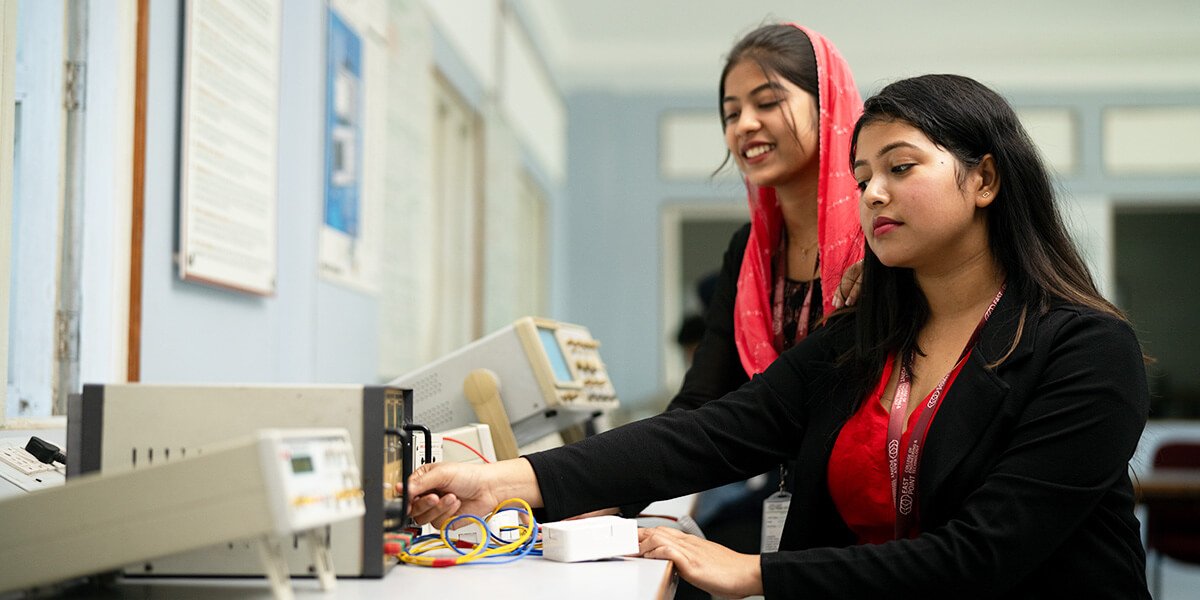Department Profile

The Department of CSE - (IoT & Cyber Security including Block Chain Technology) was established in the year 2023 to meet the growing demand for skilled professionals in the rapidly evolving fields of IoT & Cyber Security including Block Chain Technology, aiming to empower individuals with the knowledge and expertise required to navigate and contribute to this technology-driven landscape.
The Department has well qualified and experienced faculty. It ensures a comprehensive 360-degree teaching-learning environment, focusing not only on curriculum-based education but also on preparing students for future market challenges. Faculty members, enthusiastic about research, contribute to esteemed journals, conferences, and hold multiple patents.
The curriculum encompasses a comprehensive array of subjects, including Data Structures and Applications, Analog and Digital Electronics, Computer Organization, Software Engineering, Discrete Mathematical Structures, and more. From Python Programming to Cyber Security and Artificial Intelligence, students delve into cutting-edge fields like Cloud Computing, Block Chain Technology, and Mobile Computing, fostering a well-rounded understanding of modern technological landscapes.
The hands-on learning experience is enriched through specialized laboratories such as Analog and Digital Electronics, Data Structures, Design and Analysis of Algorithms, Microcontroller and Embedded Systems, Computer Network, Cryptography, and IoT. Additionally, students engage in cutting-edge technologies like Artificial Intelligence, Machine Learning, Cloud Computing with Mini Projects, Cyber Security Mini Projects, and Block Chain Application Development, culminating in practical industry exposure during internships.
HoD Message
Dear Students,
It gives me great pleasure to extend a warm welcome to the Department of Computer Science Engineering, specializing in Internet of Things (IoT) and Cyber Security including Block Chain Technology. This program was commenced during the academic year 2022-23.
This program is meticulously designed to familiarize students with the functional and operational aspects of IoT, Cyber Security, and Block Chain Technology. The department has well-equipped laboratories furnished with essential software and a team of qualified and trained staff dedicated to the teaching and learning process.
The primary goal is to contribute significantly to the holistic development of students. The department provides students with practical, hands-on experience fostering intellectual growth through collaborative research initiatives aimed at societal impact. The carefully crafted course content encourages innovation among students and guides them toward a comprehensive understanding of IoT applications, Cyber Security, and Block Chain Technologies.

Dr. Nanda Ashwin
East Point College of Engineering and Technology
The commitment to academic excellence remains steadfast. Evolving trends in curriculum design, teaching methodologies, and learning practices are consistently adapted to, offering ample opportunities for students to expand their knowledge base and access superior opportunities, including admissions to prestigious institutions for higher studies. A wide array of societal, cultural, co-curricular, and extra-curricular events are actively engaged in, enriching the academic experience.
I invite you to join us as we explore the frontiers of technology and innovation together. Together, let's pave the way for a brighter future in the world of computer science and engineering.
Laboratories

Data Structure/Design and Analysis of Algorithms Lab
Data Structure / Design and Analysis of Algorithms Lab :- This laboratory course enables students to get practical experience in design, develop, implement, analyze and testing of algorithms, Linear data structures and their applications such as stacks, queues and lists, Non-Linear data structures and their applications such as trees and graphs, Sorting and searching algorithms.
Digital Design Lab :- In Digital Design lab, students can gain the knowledge of designing digital electronic circuits, which they can understanding the hardware and simulation. The students can make use of simplifying techniques in the design of combinational circuits. The students can illustrate combinational and sequential digital circuits and demonstrate the use of flipflops and apply for registers. They can design and test counters, They can gain knowledge of simulation tools such as PSPICE, Xilinx and Modelsim.

Digital Design Lab

Operating System Lab
Operating System Lab :- In Operating System lab, students can gain the knowledge of implementing process system calls, simulate CPU scheduling algorithm, producer-consumer problem, memory allocation techniques, page replacement algorithm, linked file allocation strategies etc. by which they can understand the hardware and simulation.
Program Overview
The Department of CSE – (Internet of Things and Cyber Security including Blockchain Technology) was established during the year 2022. The department offers BE program in “CSE-(IoT & CSBT)” with an intake of 60 students. The inaugural admissions for this program were successfully concluded in December 2022. Notably, the program holds approval from the All India Council for Technical Education (AICTE), and graduates receive their degrees from Visvesvaraya Technological University, Belgaum. The department has been diligent in the creation of essential classrooms, cutting-edge laboratories, and spacious seminar halls to facilitate an enriching learning environment with sufficient volumes of books in the library. With a commitment to excellence, the department is actively attracting top-tier talent for both teaching and research roles.
Program Specific Outcomes
- To conceptualize, model, design, simulate, analyse, develop, test, and validate computing systems and solve technical problems arising in the field of Computer Science & Engineering.
- To specialize in the sub-areas of Computer Science and Engineering such as Cloud Computing, Robotic Process Automation, Cyber Security, Big data Analytics, User Interface Design and IOT to meet industry requirements.
- To build innovative solutions to meet the demands of the industry using appropriate tools and techniques.
Program Outcomes
- Engineering knowledge :- Apply the knowledge of mathematics, science, engineering fundamentals, and an engineering specialization to the solution of complex engineering problems.
- Problem analysis :- Identify, formulate, review research literature, and analyse complex engineering problems reaching substantiated conclusions using first principles of mathematics, natural sciences, and engineering sciences.
- Design/development of solutions :- Design solutions for complex engineering problems and design system components or processes that meet the specified needs with appropriate consideration for the public health and safety, and the cultural, societal, and environmental considerations.
- Conduct investigations of complex problems :- Use research-based knowledge and research methods including design of experiments, analysis and interpretation of data, and synthesis of the information to provide valid conclusions.
- Modern tool usage :- Create, select, and apply appropriate techniques, resources, and modern engineering and IT tools including prediction and modelling to complex engineering activities with an understanding of the limitations.
- The engineer and society :- Apply reasoning informed by the contextual knowledge to assess societal, health, safety, legal and cultural issues and the consequent responsibilities relevant to the professional engineering practice.
- Environment and sustainability :- Understand the impact of the professional engineering solutions in societal and environmental contexts, and demonstrate the knowledge of, and need for sustainable development.
- Ethics :- Apply ethical principles and commit to professional ethics and responsibilities and norms of the engineering practice.
- Individual and team work :- Function effectively as an individual, and as a member or leader in diverse teams, and in multidisciplinary settings.
- Communication :- Communicate effectively on complex engineering activities with the engineering community and with society at large, such as, being able to comprehend and write effective reports and design documentation, make effective presentations, and give and receive clear instructions.
- Project management and finance :- Demonstrate knowledge and understanding of the Engineering and management principles and apply these to one’s own work, as a member and leader in a team, to manage projects and in multidisciplinary environments.
- Life -long learning :- Recognize the need for and have the preparation and ability to engage in independent and life -long learning in the broadest context of technological change.
Program Educational Objectives (PEOs)
- PEO 1. Graduates will possess the ability to apply their knowledge of fundamental engineering, Computer Science in the areas of IoT and Cyber Security.
- PEO 2. Graduates will have sound intercommunication skills, ethical values and responsibilities to work and serve for the development of the society.
- PEO 2. Graduates will be able to understand, interpret, model and implement IoT based solutions for real world problems.

